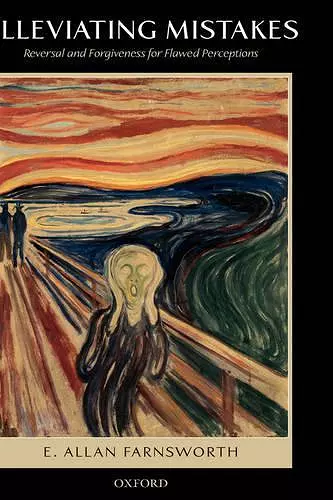Alleviating Mistakes
Reversal and Forgiveness for Flawed Perceptions
Format:Hardback
Publisher:Oxford University Press
Published:30th Sep '04
Currently unavailable, and unfortunately no date known when it will be back

How often our actions go awry because our perceptions are at odds with reality! This book examines the legal issues that arise when we seek to avoid the untoward consequences of an action by claiming that our perception was flawed. We all make mistakes. Some have unfortunate consequences: we might overpay a debt or make an unfavourable contract, or we might be sued or accused of a crime as a result of our mistake. Claims to alleviation on the grounds of mistake are likely to arise wherever the law prescribes a state of mind (some kind of intent) as a prerequisite for the application of a legal rule. This book asks when the fact that a person made a mistake should entitle them to alleviation. This may involve the intention to enter into a contract or a payment, in which case a person could seek its reversal, or it might involve the intent to commit a tort or crime, in which case they could seek forgiveness for the offence. Farnsworth defines 'alleviating' mistakes as those which entitle a person to relief from untoward consequences of their mistake. There is no general 'law of mistake', and despite their similarities, few discussions of mistake in one setting pause to consider mistakes in other contexts. The goals of fields as disparate as contracts and criminal law are very different: how do these differences affect the treatment of mistakes? Farnsworth sets out a new taxonomy of mistakes. His analysis reveals that over the past century, there has been a remarkable increase in the receptivity of courts and scholars to claims for both reversal and forgiveness- a waxing of alleviating mistakes.
'...an elegant and scholarly inquiry on the kind of mistakes that entitle those who commit them to seek relief from the courts of the unfortunate consequences of their action. This work is organized around three main parts: first, alleviating mistakes are distinguished from the myriad of other mishaps, secondly, problems of scepticism and proof of such mistakes are dealt with; and finally, factors which influence the availability of relief are considered. ...a seminal work that no legal scholar interested in mistakes could afford to do without.' * Tang Hang Wu, Assistant Professor, National University of Singapore *
E. Allan Farnsworth is one the most influential and admired scholars in the field of civil obligation, and in this lively and engrossing book, he offers a new analysis and fresh meditation for the topic of mistakes -- flawed estimations of reality -- and their role in negating responsibility for both intentional offenses and consensual obligations. Bristling with perspicuous quotations from literature and psychology, informed by telling legal vignettes ... not only a masterful synthesis but also a terrific narrative filled with the illustrative detail and human interest that make legal abstractions meaningful for all readers... a wonderfully original study that provides a lively and lucid account of the connections -- heretofore little noted or noticed -- between the notions of "mistake" operative in various legal contexts. * James Etienne Viator, Adams & Reese Distinguished Professor of Civil Law Loyola University (New Orleans) School of Law *
ISBN: 9780199276110
Dimensions: 242mm x 161mm x 20mm
Weight: 500g
232 pages